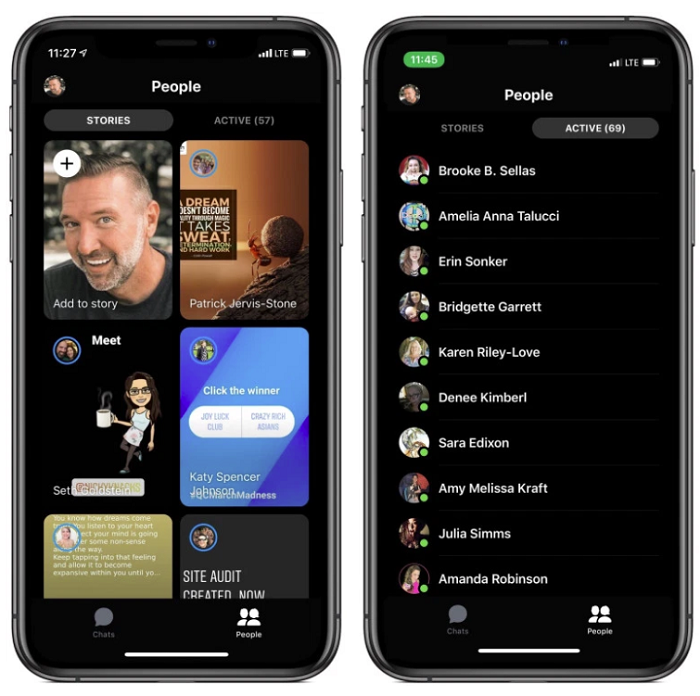SOCIAL
Facebook’s Rolling Out a New Design for Messenger Which Will See The Removal of the Discover Tab

After first announcing its intention to simplify Messenger back in 2018, Facebook is now close to launching the next stage, with TechCrunch reporting that The Social Network is rolling out an updated layout for Messenger which eliminates the ‘Discover tab’, taking it down to simply ‘Chats’ and ‘People’ as your in-app navigation options.

As you can see in this example, provided by social strategist Jeff Higgins, there are now only two tabs, which puts the focus squarely on your private conversations – here’s a shot of the current Messenger layout for reference:

As noted, that aligns with Facebook’s push to make Messenger more focused. Back in 2018, then chief of Messenger David Marcus noted that:
“Over the last two years, we built a lot of capabilities to find the features that continue to set us apart. A lot of them have found their product market fit; some haven’t. While we raced to build these new features, the app became too cluttered. Expect to see us invest in massively simplifying and streamlining Messenger this year.”
Facebook has slowly been working towards this goal since, and this will be the biggest shift to date along these lines.
As you can see in the example, Stories will also get added attention. In the new layout, when you tap on the ‘People’ tab, the initial screen will be a showcase of all the Stories your connections have shared in the last 24 hours. You’ll then need to switch across to the ‘Active’ list to see which of your connections are online.
Facebook has confirmed the update, and said that it will begin rolling out to users in the next week.
It’s a big shift, which in some ways, changes the direction for Messenger. But really, that change has been brought about by users anyway, as they’ve dictated how they prefer to utilize the app.
Back in 2016, Facebook announced its Messenger Bot platform, which, at the time, it heralded as the next big thing, the next big shift that would make Messenger a key, functional utility in virtually every aspect of your day-to-day life.

Facebook seemed to be modeling its approach on the Chinese market, where WeChat has become a key connector for everything from paying your utility bills to buying groceries to even getting an instant loan, direct in the app.
Except, it didn’t play out that way.
While Facebook saw the future in bots, what it actually found was that most users weren’t overly keen on the option – and while the number of bots has grown (there were 300k active Messenger bots at last check), and usage of bots is increasing, they’re still not seeing rapid take-up, and they’re unlikely to become the transformative tool that Facebook once hoped.
Bots also don’t look like being the thing that finally facilitates more extensive Messenger monetization, another key aim for The Social Network. While messaging use is on the rise, Facebook is still grappling with that next stage, and converting all that attention into a more solid revenue stream, via both Messenger and WhatsApp.
Bots, and the Discover tab, were once seen as key to this, but this new update clearly shows that this won’t be, as the Mandalorians say, the way.
So what is the way? It seems that Facebook is now looking to payments and eCommerce to facilitate the next shift in messaging monetization – and while this update does lessen the focus on business discovery in the app, people will still be able to connect with the businesses that they choose, which is obviously what Facebook has found is the more common method of business connection in the app.
What we’re seeing in other markets is the push towards Facebook Pay and WhatsApp Pay, which would enable easy funds transfer within messaging streams. Ideally, Facebook’s Libra cryptocurrency would also play a part, though that’s still largely up in the air (despite adding another new Libra Association member this week).
The playbook here appears to be to initially facilitate funds transfer within messaging streams, then, once money is already being moved in these apps, to add in eCommerce tools to provide shopping options with the same funds, then build on the payments eco-system from there.
Facebook’s already buying up partner businesses for this push. Last year, the company purchased Indian eCommerce provider Meesho, which primarily operates on WhatsApp.
If Facebook can build WhatsApp Pay in Asian markets, that could provide a whole new business eco-system within the messaging app, which could also provide the template for the same via Messenger in Western regions.
That seems to be the next big opportunity, and within that, the simplification of Messenger makes logical sense. Rather than trying to push people to expand their behaviors, Facebook’s looking to pare back, and align with what people want. That’ll put more onus on individual businesses and developers themselves to get people to their Messenger apps and tools – but then, they’ll probably have to use Facebook ads to do that, another win for the company.
From a social media marketing perspective, the change will obviously change bot and app discovery, which could have an impact, while it could also put more emphasis on Stories, given their prominent placement.
But really, the biggest implication will be down to connection, and ensuring that you give your audience reason to connect with your business via Messenger. Without the same discovery options, people won’t randomly come across your Messenger presence anymore (if they ever did), which will mean that you need to provide them with a reason to connect outside of the app itself.
That adds another consideration to Messenger marketing, but really, it’s likely much the same as it’s always been. The update just makes this a more refined focus moving forward.
